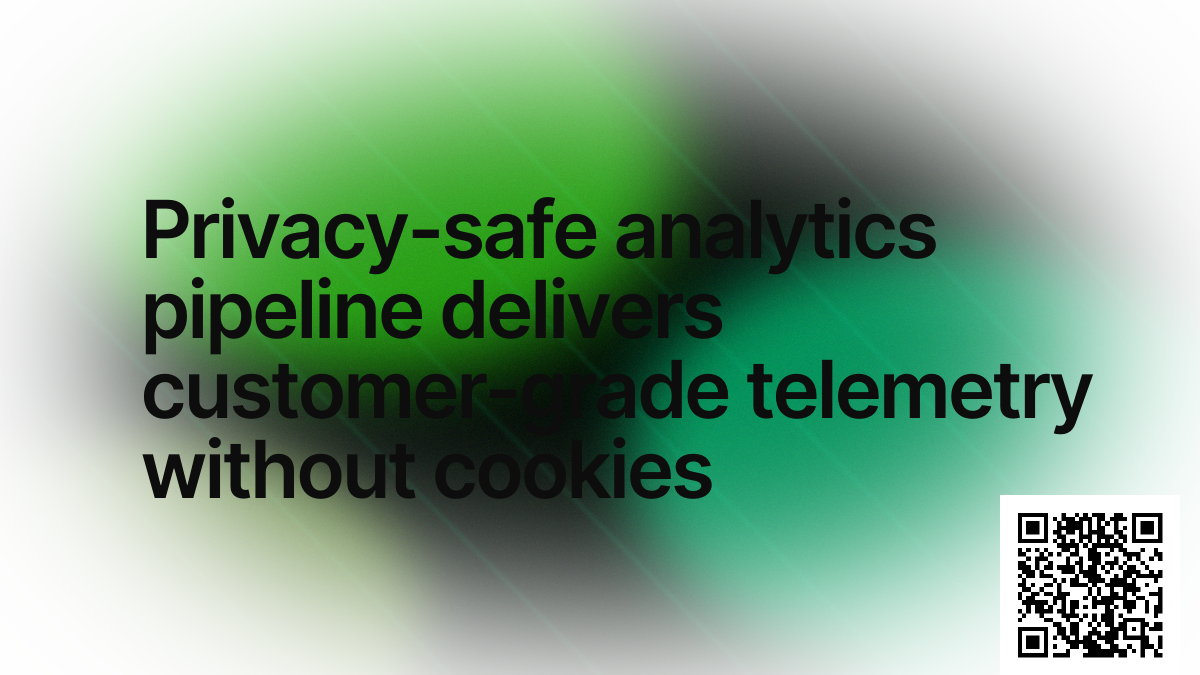Privacy-safe analytics pipeline delivers customer-grade telemetry without cookies

Why rebuild analytics now
Marketers have spent the past two years wrestling with cookie deprecation, browser restrictions, and rising regulatory scrutiny. Service and SaaS teams rely on conversion data to justify spend, yet legal teams increasingly block client-side scripts that collect personal data without explicit consent. MyDomAI has rebuilt its analytics pipeline to operate without third-party cookies, fingerprinting, or invasive scripts. The new privacy-safe telemetry layer launches today for every MyDomAI customer, delivering actionable insight while meeting the strictest privacy standards in Europe, North America, and Asia-Pacific.
Event architecture at a glance
Instead of storing identifiers in the browser, MyDomAI now generates session keys on the server when a visitor lands on a customer page. The keys persist only for the duration of a session and expire within 30 minutes of inactivity. Client-side components emit events—page views, CTA clicks, form submissions—along with contextual metadata such as device type and campaign tags. Events travel through an edge network that strips IP addresses, geolocation details, and user agents before they enter the analytics warehouse. Each event carries a compliance watermark so auditors can confirm the data path.
Meeting global privacy obligations
The pipeline satisfies GDPR, CCPA, LGPD, and the upcoming US federal privacy baseline by design. Users receive clear notices that analytics operate without personal data. Because no cookies exist, opt-out mechanisms become simple toggles that pause event emission entirely. Customers targeting sensitive markets can enable regional data residency, keeping European events in EU-based storage, for example. The privacy office at MyDomAI will continue publishing third-party assessments to document adherence to evolving legislation.
Maintaining measurement fidelity
Removing cookies often raises concerns about data quality. MyDomAI mitigates this by correlating anonymous session data with campaign parameters, unique page identifiers, and consent states. When visitors submit forms or schedule calls, the system links that conversion to the anonymous session using short-lived tokens that expire once the lead enters the customer’s CRM. This approach keeps conversion funnels intact without tracking individuals across multiple visits. Customers continue to see first-touch, last-touch, and multi-touch attribution inside dashboards with no discernible drop in accuracy.
Integrations with existing tooling
Many MyDomAI customers rely on external analytics suites. The new pipeline pushes aggregated metrics to tools like Looker, Tableau, and Microsoft Fabric through nightly exports. For marketing automation platforms, webhook connectors deliver conversion signals in near real time while preserving privacy guarantees. The exports contain no personal data, only campaign identifiers and performance metrics.
Lighthouse performance benefits
Shedding cookies and reducing client-side scripts pays performance dividends. MyDomAI landing pages now load fewer assets, improving Time to Interactive and total blocking time. Internal tests show Lighthouse accessibility, best practices, and performance scores holding at 100/100 for the new template releases thanks in part to lighter analytics. Customers no longer need to balance measurement accuracy against page speed; the privacy-safe pipeline delivers both.
Governance and transparency
Administrators gain a dedicated privacy dashboard that outlines data flows, retention windows, and export destinations. The dashboard lists every property that emits events, the consent state for each session, and any deviations from standard configuration. MyDomAI stores raw events for 30 days, aggregated metrics for 18 months, and allows administrators to purge data instantly if policies change. The governance layer also alerts legal teams when new jurisdictions introduce regulations, suggesting configuration updates where helpful.
Practical guidance for launch teams
With the new pipeline in place, launch teams should:
- Update privacy notices to mention event-based analytics without cookies.
- Link CRM and MyDomAI identifiers so revenue teams can trace qualified leads back to sessions without storing personal data on landing pages.
- Enable regional data residency if expansion plans include jurisdictions with strict localization requirements.
- Test consent banners across mobile and desktop to ensure visitors understand data collection practices.
Early adopter feedback
Customers testing the pipeline for the past month report smoother legal reviews and faster launch approvals. A fintech agency reduced compliance review time by 40 percent because auditors could see an end-to-end data flow diagram. A healthcare automation provider received approval from a hospital network that previously banned marketing scripts outright. Meanwhile, a retail collective appreciated the 12 percent rise in conversion rates after removing heavy client-side trackers that slowed page loads.
Roadmap and ongoing support
The analytics team is already developing predictive insights powered by the new event stream. Upcoming releases will recommend experiments based on statistically significant patterns and forecast potential revenue impact by campaign. Support engineers are available to help customers migrate historical dashboards or connect new destinations. Detailed documentation, sample privacy notices, and implementation checklists live in the MyDomAI knowledge base for self-serve teams.
Privacy regulations will continue to tighten, but launch velocity cannot stall. MyDomAI’s privacy-safe analytics pipeline proves that teams can collect the performance data they need while honoring user expectations and legal requirements. Customers get accurate telemetry, pages stay fast, and compliance officers gain transparency. That combination keeps launch programs resilient in the face of shifting policy landscapes.
